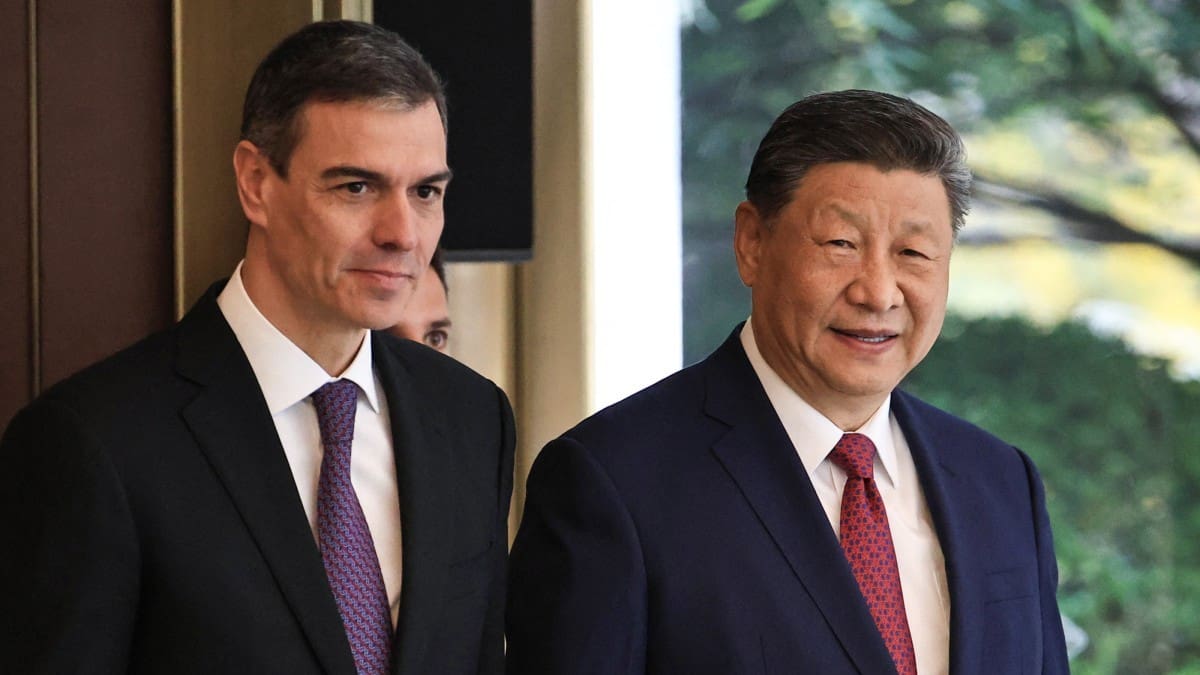
Chinese President Xi Jinping (R) and Spanish Prime Minister Pedro Sánchez ahead of a bilateral meeting in Beijing on April 11, 2025.
Andres Martinez Casares / POOL / AFP
Spanish Prime Minister Pedro Sánchez’s recent diplomatic tour through Asia, notably his visits to China and Vietnam, has triggered significant European controversy. Officially aimed at enhancing economic ties between Spain, the EU, and Asian nations amidst escalating U.S.-China trade tensions, Sánchez’s approach has raised concerns about ideological consistency and strategic wisdom. Critics highlight the paradox between Sánchez’s fierce denunciation of former U.S. President Donald Trump and Spain’s Francoist legacy and his warm diplomatic overtures to communist leaders such as China’s Xi Jinping and Vietnam’s symbolic figure Ho Chi Minh, accusing him of selectively moralizing and indirectly endorsing authoritarian regimes.
Sánchez’s meeting with Xi Jinping in Beijing on April 10 is notable as the first by a European leader following recent steep U.S.-China tariff escalations—up to 145% by the U.S. and a retaliatory 125% by China. During their discussions at Beijing’s Diaoyutai State Guesthouse, Sánchez reinforced Spain’s commitment to a “deeply pro-European” policy, advocating dialogue, reciprocity, and balanced relations with China. Xi Jinping praised Sánchez’s emphasis on multilateralism, notably referencing Sánchez’s joint criticism with Brazilian President Lula da Silva and South African President Cyril Ramaphosa against “unilateral actions,” clearly targeting U.S. policy.
Sánchez’s earlier stop in Vietnam, highlighted by his tribute at Ho Chi Minh’s mausoleum, further emphasizes his diplomatic pivot toward communist-led states. His persistent advocacy against EU tariffs on Chinese electric vehicles aligns closely with Beijing’s strategic interests despite potential backlash from European industries already under strain. The recent Huawei scandal is still under investigation and deserves a separate mention.
While Chinese investments in Spain remain relatively modest (€327 million from 2022 to 2024), Sánchez anticipates significant growth should trade barriers ease. He actively promotes deeper EU-China economic cooperation, emphasizing potential mutual benefits, especially as Chinese enterprises increasingly target European markets. However, many observers caution against the inherent risks. China’s economic coercion and strategic manipulation record suggests Europe could become excessively dependent on Beijing, compromising its sovereignty and financial resilience.
Sánchez’s alignment with Beijing’s narrative of opposing “unilateral bullying” implicitly critiques U.S. policy yet conveniently overlooks China’s breaches of international law, including territorial aggression in the South China Sea and economic intimidation of smaller countries. U.S. Treasury Secretary Scott Bessent warned that deepening EU-China relations might amount to “digging your own grave,” echoing conservative European concerns.
Domestically, Sánchez has aggressively campaigned against Franco’s legacy, pushing policies to rename streets and relocate Franco’s remains under the guise of historical memory. Now, he is trying to take over the Valley of the Fallen and “resignify” it in a museum to reeducate Spaniards into the socialist version of national history, a process reminiscent of what China has done with regard to its imperial history.
Sánchez’s gestures toward controversial communist figures abroad has raised eyebrows. Ho Chi Minh’s Vietnam was marked by brutal repression and forced collectivization. Xi Jinping’s China faces widespread criticism for human rights abuses, including mass internment in Xinjiang and repression in Hong Kong. Sánchez’s diplomatic silence on these issues has provoked accusations of hypocrisy, suggesting a politically convenient rather than principled stance. All in all, the Spanish PM’s Asia diplomacy risks alienating Europe’s principal security ally, the U.S., particularly critical in a period of escalating geopolitical tensions.
